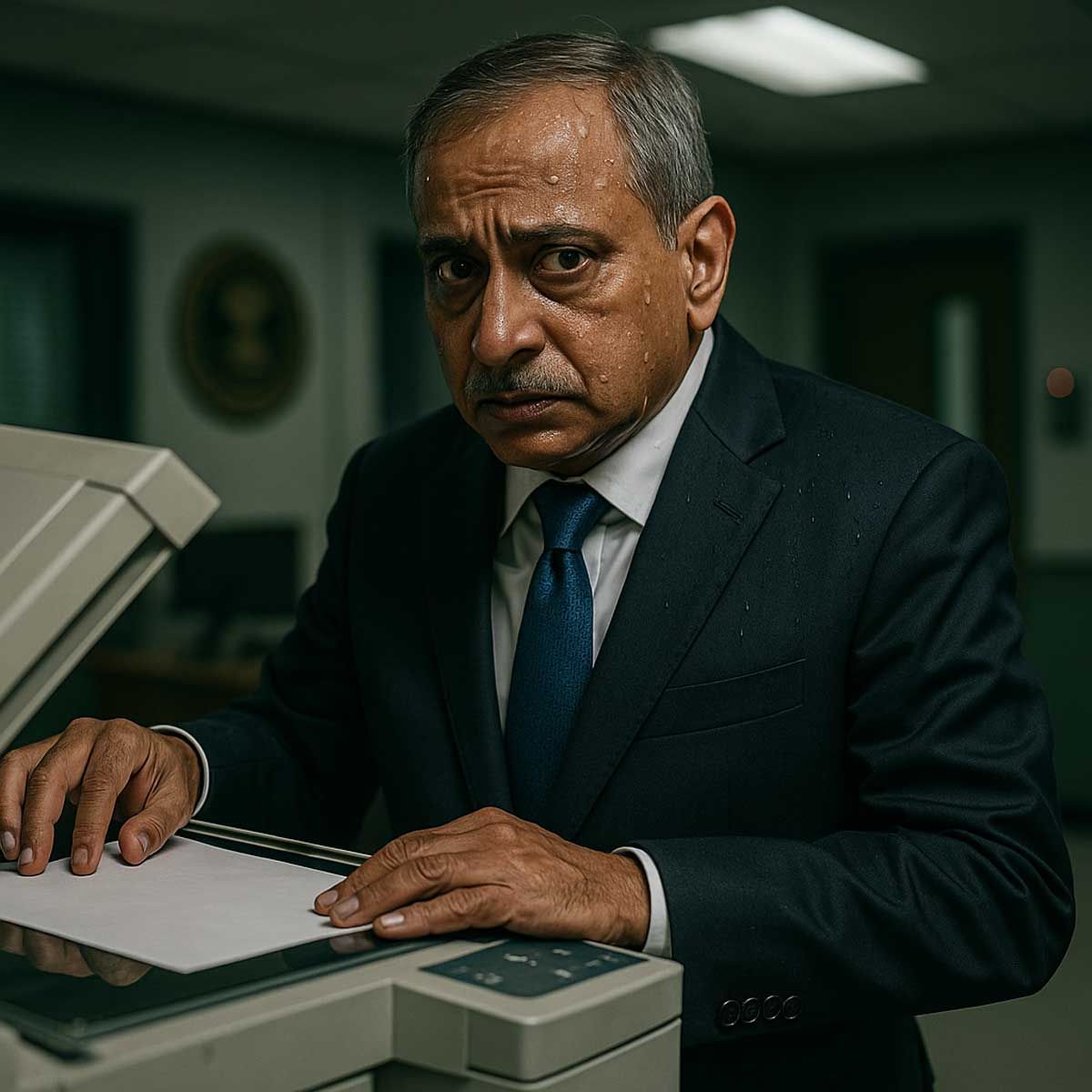More Coverage
Twitter Coverage
Satyaagrah
Written on
Satyaagrah
Written on
Satyaagrah
Written on
Satyaagrah
Written on
Satyaagrah
Written on
JOIN SATYAAGRAH SOCIAL MEDIA
"White Man's Burden": A BBC editor Mary Harper's involvement in assisting 15 Somali criminals, among them a gang rapist, to escape UK deportation unfolds accumulating £1M taxpayer bill, leading to delayed extensive legal fights, significant public outcry

A BBC editor has been implicated in aiding at least 15 Somali criminals, including a gang rapist, to contest their deportation from the United Kingdom, according to reports from British media. This involvement has sparked widespread controversy and debate over the ethics and responsibilities of media professionals in legal matters.
|
The individual at the center of these allegations is Mary Harper, the African Editor of the BBC World Service. Reports suggest that Harper was compensated for providing expert evidence in the deportation case of Yaqub Ahmed, a Somali convicted of gang rape. This case has brought to light her broader role in supporting several other Somali offenders in their appeals against deportation.
Investigations reveal that Harper's expert witness testimony benefitted not just one, but multiple Somali offenders facing deportation for various serious crimes. Among these were three other sex offenders, three drug dealers, and a repeat offender with a long history of criminal activity in the UK.
One striking instance highlighted in the reports is Harper's intervention on behalf of a criminal with a daunting record of 39 convictions for 80 crimes over a span of 17 years. Harper reportedly argued that deporting this individual to Somalia would result in his ostracization by his clan due to his extensive criminal history in the UK.
The involvement of Mary Harper, a BBC editor, in assisting Somali criminals with their UK deportation appeals continues to stir controversy. Among the cases Harper was involved in, one particularly striking instance involved a 29-year-old Somali sexual offender. Harper argued that deporting this individual would place him at a "severely heightened risk" due to his criminal record involving a sexual assault on a 17-year-old deaf girl. Despite Harper's efforts, the appeal against deportation was ultimately rejected by a judge, highlighting a clash between legal judgments and expert testimony provided by media professionals.
|
Despite the judge's decision, the accused remains in the UK, residing in a council flat with his family. Legal protections have shielded the identity of the attacker, preventing public disclosure. This situation raises questions about the effectiveness of the UK's deportation process and the protections afforded to individuals with serious criminal convictions.
In the aftermath of these revelations, the BBC has announced that Harper is set to leave the organization. Her departure, scheduled for later this month, marks the end of her tenure as a journalist reporter. The circumstances surrounding her exit—whether it was a resignation or a dismissal—remain unclear, adding another layer of intrigue to the ongoing debate over the ethical responsibilities of journalists involved in legal matters.
Harper's involvement in these deportation cases has not only brought her professional actions under scrutiny but also sparked a broader discussion on the role of media figures in influencing legal outcomes.
|
The UK's asylum system faces scrutiny after a refugee, accused of a serious chemical assault that harmed a mother and child, navigated through a series of legal challenges to secure permission to stay in the country. This individual, Abdul Shokoor Ezedi, 35, made headlines for his journey fraught with legal and ethical complexities.
Ezedi's arrival in the UK in 2016, hidden in the back of a lorry, marked the beginning of a contentious asylum process. Despite a criminal conviction in 2018 for a sexual offence, his initial rejections for asylum took a pivotal turn due to an unexpected factor: his conversion to Christianity. This conversion, and the subsequent support from a priest who vouched for his dedication to the new faith, played a crucial role in the reversal of earlier decisions against his asylum pleas.
The narrative around Ezedi's case underlines the intricacies involved in asylum decisions, especially when they intersect with claims of religious conversion. The fact that Ezedi, despite being twice rejected for asylum and found guilty of a sexual offence, was allowed to remain in the UK following his conversion raises questions about the criteria and processes used in assessing asylum claims.
Ezedi's story also sparked a nationwide manhunt, emphasizing the lengths to which authorities went in response to his illegal entry and subsequent criminal actions. Yet, it was his claim that deportation to his native Afghanistan would endanger his life, coupled with his professed religious conversion, that ultimately influenced his ability to stay in the UK.
In light of the recent controversies involving the assistance of Somali criminals in their UK deportation cases by a BBC editor, official statements have been released by both the Home Office and the BBC, shedding light on their respective stances and policies.
|
|
The Home Office has made its position clear regarding foreign national offenders within the UK. A spokesman emphasized the government's commitment to removing these individuals from the country, stating, "Foreign national offenders have no right to be in the UK, which is why we are deporting them and banning their return to the UK. Over 16,000 Foreign national offenders have been removed since January 2019. Through both our Nationality and Borders Act and the Illegal Migration Act, we are also ensuring they cannot frustrate the removal process."
The BBC, on the other hand, sought to distance itself from the actions of its staff member involved in the deportation cases. The corporation clarified its policy regarding staff undertaking external work, such as acting as expert witnesses. A BBC spokesman further elaborated, "While there is nothing in the BBC’s rules that prevent staff acting as expert witnesses, the BBC has clear processes in place to ensure any external work of this nature has prior approval. We are unable to comment on the specific details of this particular case and, more broadly, do not comment on individual staff matters."
Amid these developments, Mary Harper, the editor at the center of the controversy, has not responded to requests for comment. This lack of response leaves many questions unanswered, particularly regarding her motivations and the specifics of her involvement in the cases in question.
These official statements provide a glimpse into the complex interplay between government policies, media corporation rules, and individual actions. As the debate continues, the focus remains on the balance between legal obligations, ethical considerations, and the broader implications for public trust and safety.
It Took 16 Years to Boot Somali-British Gang Rapist Out of Britain
The saga of Yaqub Ahmed, a Somali national convicted of gang rape, and his prolonged battle to remain in the UK, underscores the intricate and often contentious nature of deportation cases. After a five-year legal struggle, Ahmed's deportation was finalized in November, a significant development that came to fruition after he consented to bear the costs for his accommodation and therapy.
Ahmed's case has been notable not only for the severity of his crime but also for the public's reaction to his attempted deportation. Initially sentenced to nine years in prison for raping a 16-year-old girl in London, his story took a dramatic turn during a deportation attempt in 2018. The attempt was thwarted by passengers on the plane, who, unaware of his conviction, protested his removal, leading to his stay on the flight being canceled.
This incident, occurring in October 2018 on a plane from Heathrow to Turkey, has highlighted significant challenges within the UK's deportation process, particularly regarding public awareness and the rights of those being deported. The passengers' protest, rooted in a lack of information about Ahmed's criminal background, illustrates the complexity of balancing legal processes with public sentiment and the principles of justice and rehabilitation.
Moreover, the fact that Ahmed's deportation comes nearly 16 years after his arrest points to the prolonged and complicated nature of deportation proceedings, especially in cases involving serious offenses. The delay raises questions about the efficiency and transparency of the UK's immigration and legal systems, as well as the mechanisms in place to ensure that such individuals do not exploit legal loopholes to avoid deportation.
The attempted deportation of Yaqub Ahmed, a convicted gang rapist, took a dramatic turn when a video of the incident made its way to the public eye. In the footage, Ahmed can be heard screaming while passengers on the plane, unaware of his criminal history, vocally demanded his removal from the flight. This led the Home Office team, composed of four members and tasked with overseeing Ahmed's deportation, to cease their efforts and take him off the aircraft.
This incident occurred in 2018, during which passengers' protests directly influenced the decision to halt Ahmed's deportation process. Following this event, Ahmed was granted bail in March 2019, equipped with an electronic tag, and was subsequently released onto the streets. However, he was later taken back into custody and placed in a detention center.
The case further complicated as Ahmed's victim, who has endured post-traumatic stress disorder (PTSD) due to the assault, shared with the Mail on Sunday her reaction to the video. She expressed feeling "angry and upset" upon witnessing the protest that prevented Ahmed's deportation, highlighting the personal and ongoing impact of the crime on her life.
The victim of Yaqub Ahmed, who has endured years of trauma following a brutal attack, criticized the passengers who prevented his deportation. She expressed her frustration, pointing out that despite Ahmed being in handcuffs and in the process of being deported, the passengers intervened without understanding the gravity of his crimes. "He was in handcuffs, he was being taken out of the country… who are you people to interfere with justice?" she questioned. The victim also expressed a hope that those who intervened would reconsider their actions, especially now knowing the impact it had on her sense of safety. "Fair enough you didn’t know the situation, but now I hope you feel proud of yourselves because you stopped something that I have waited for for so long: something that made me feel that little bit safer."
Finally, after 16 years from his initial arrest, Ahmed's deportation to Somalia is set to proceed, a development Tory MP Nigel Mills described as "very good news." Mills emphasized the severity of Ahmed's crime and the importance of ensuring such offenders are not allowed to remain in Britain, stating, "It was a sickening crime and he has no right to walk free in Britain. We need to send a strong message out that offenders like this have no place in this country. Unfortunately, he will not be the only case of its kind."
The victim's harrowing experience began when she was deceived into going to a flat in Crouch End, North London, under the pretense that her friend was waiting for her there. It was in this flat where she was forcibly held down and raped by multiple men in turns, a nightmare that was partially witnessed through her screams heard by neighbors, who then alerted the police. Despite the attackers' denial of the rape charges, forcing the case to trial, the woman had to endure the additional trauma of reliving the attack in court.
Yaqub Ahmed, along with Adnan Mohamud and Adnan Barud, both 19 and 21 years old respectively at the time, were sentenced to nine years in prison for their involvement in the rape case. A fourth individual, Ondogo Ahmed, who was also 19 years old, received an eight-year sentence for conspiracy to rape but later died in 2013 while fighting for ISIS.
Following the publicized failure of Ahmed's deportation in 2019, the victim's mother expressed her hope that successfully deporting him would finally offer her daughter a sense of safety and represent a form of justice. She articulated the profound and lasting impact the ordeal had on her family, stating, "It’s been never-ending. That’s my child’s life – her childhood – that has been taken away." She also expressed a desire for an apology from "each and everyone" of the passengers whose intervention led to Ahmed being allowed back into the country, criticizing their decision to interfere in a matter that did not concern them directly and its consequences for her daughter.
The Home Office, addressing the situation, underscored its commitment to public safety and its policy towards foreign nationals who commit crimes in the UK. "We are determined to protect the public by removing foreign nationals who commit criminal offences," the Home Office declared, affirming its stance on dealing with individuals convicted of crimes and the broader implications for immigration and deportation policies.
|
Yaqub Ahmed's prolonged fight against deportation from the UK, with the alleged assistance of a BBC editor, highlights a complex interplay of legal battles, media involvement, and public funds. After a five-year legal struggle, Ahmed was eventually deported from the UK in November, marking the end of a 15-year saga, but only after he agreed to cover his hotel and therapy costs.
This case escalated to the Court of Appeal, where government lawyers successfully countered three attempts made by Ahmed and his legal team to overturn the deportation decisions. The financial toll on taxpayers for Ahmed's legal proceedings, prison stay, and deportation efforts was substantial, with The Mail reporting costs reaching up to £1 million.
In an ironic twist, while the BBC prides itself on delivering news with integrity and impartiality, the involvement of one of its editors in aiding Somali criminals, including Ahmed, to fight their deportation cases presents a starkly different narrative. It seems the BBC's latest drama series unfolds not on the screen but in the courtroom, featuring a cast of criminals, a dedicated editor, and the British taxpayer. In this episode, the plot twist isn't just about the battle against deportation but the hefty £1 million production cost footed by an unwitting public.
As this saga concludes with Ahmed's deportation, one can't help but ponder the next storyline from the BBC's editorial floor. Perhaps a sequel on how to spend public funds on legal dramas with a touch of expert witness flair? Only time will tell, but for now, the credits roll on this costly legal battle, leaving audiences both bewildered and bemused.
 Support Us
Support Us
Satyagraha was born from the heart of our land, with an undying aim to unveil the true essence of Bharat. It seeks to illuminate the hidden tales of our valiant freedom fighters and the rich chronicles that haven't yet sung their complete melody in the mainstream.
While platforms like NDTV and 'The Wire' effortlessly garner funds under the banner of safeguarding democracy, we at Satyagraha walk a different path. Our strength and resonance come from you. In this journey to weave a stronger Bharat, every little contribution amplifies our voice. Let's come together, contribute as you can, and champion the true spirit of our nation.
 |  |  |
| ICICI Bank of Satyaagrah | Razorpay Bank of Satyaagrah | PayPal Bank of Satyaagrah - For International Payments |
If all above doesn't work, then try the LINK below:
Please share the article on other platforms
DISCLAIMER: The author is solely responsible for the views expressed in this article. The author carries the responsibility for citing and/or licensing of images utilized within the text. The website also frequently uses non-commercial images for representational purposes only in line with the article. We are not responsible for the authenticity of such images. If some images have a copyright issue, we request the person/entity to contact us at This email address is being protected from spambots. You need JavaScript enabled to view it. and we will take the necessary actions to resolve the issue.
Related Articles
- 'RIP Secularism': TOI gives platform to pedophilia-accused British journo Hasan Suroor to mouth platitudes on ‘secularism’ over Gyanvapi, paint Hindus as aggressors and Muslims as victims of ‘majoritarianism’
- Journalist Naomi Barton associated with Leftist propaganda website, The Wire tells a woman who felt violated to ‘not weaponise her privilege’ against a man who ‘was from a lower-class chain’
- "लो, कर लो बात": Dr. S. Jaishankar exposes the irony of Western media - quick to critique yet slow to reflect, as they litigate their own elections and still presume to lecture India on democracy, a nation with strong voter turnout and vibrant democracy
- "Fake news: the wolf in the media's clothing": Refuting claims of Saket Gokhale and others of 300% budget overshoot on G20 Summit, Govt asserted that the 'expenses directed towards permanent asset creation', shedding light on infrastructural developments
- Propagandists spread hue and cry after PM's new Mercedes Maybach which is a routine replacement, but hushed on Sonia Gandhi using Range Rovers procured for the then PM
- American news daily, New York Times marked a new low in exerting its stupidity, publishes a report saying India was partitioned from Pakistan: Already known for peddling fake news and disseminating propaganda
- From Shabana Azmi's ‘daaru delivery dude’ and Aurangabad teen’s NASA claims to Nidhi’s Harvard job: Most talked about frauds of 2021
- Untraceable Rahul Gandhi found partying at wedding of former CNN journalist Sumnima Udas in Nepal: Udas is a rabid anti-India propagandist, supported anti-CAA rioters, and attacks Indian sovereignty
- Anything atrocious and we have Hindu identity to merit, but for the good, we have a tough choice: Mughals, British, or Nehru
- Selling of alcohol, narcotics or meat banned around Sri Krishna Janmasthan Mandir in Mathura by Yogi Adityanath Govt: TOI raises Shahi Idgah issue and peddles sob stories, preparing the next cycle of outrage
- Tehelka News | In a ground-breaking verdict, the Delhi High Court slapped Tehelka, Tarun Tejpal, Aniruddha Bahal, Mathew Samuel with an order to pay ₹2 crore to Major General MS Ahluwalia following a 2001 sting operation that defamed the ex-Army officer
- Indian diaspora welcomed Modi in Berlin geared up in traditional attire, Dhol-Tasha celebration and proudly waving Bhagwa: Faces Hinduphobic vitriol and bombardment of trolling and criticism
- "A city betrayed: Truth twisted, trust broken": Dublin reels - Algerian immigrant stabs 3 kids, leaving 1 critically injured; BBC, Washington Post twist facts, playing verbal gymnastics to mask attacker's origins, fueling public outrage & demand for truth
- "Any man can make mistakes, but only an idiot persists in his error": Problematic tweet by India Today GM insulting Draupadi Murmu got good bashing by netizens, deactivates FB account after post goes viral that said ‘Don’t support Adivasi President
- Dr. Oumair Aejaz, originally from Bengaluru, charged with sex crimes in the US for recording thousands of nude videos of women & kids, spotlighting media bias in labeling Muslim perpetrators as 'Indian' or 'Asian' in crimes against young non-Muslim girls




























